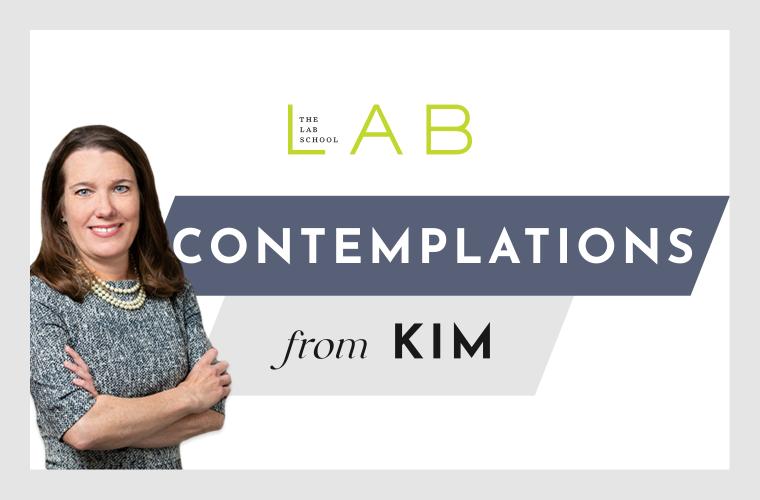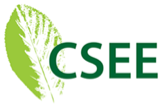Contemplations from Kim: A Life-Changing, Eye-Opening School
A monthly column from the Head of School

Scroll down to listen to an audio recording of this month's column.
A Life-Changing, Eye-Opening School
That’s Lab – according to three high school students, Jack (’22), Miguel (’23), and Mackenzie (’25). All three of them have been at Lab since elementary school, and last Friday they took time out of their busy afternoons to sit down with me in my office and talk about their journeys with dyslexia.
Let me tell you a little more about the genesis of this conversation.
As the mother of a dyslexic daughter, I’ve always wanted there to be a bit more understanding that being dyslexic isn’t just about the things that are challenging.
No doubt, there are many challenges.
When you are young and in a classroom where it feels like no matter how hard you’re trying, you’re not reading, writing, or “getting it” as quickly as as everyone else, it can feel overwhelming.
As a parent, coming to grips with the fact that your child needs something different from school can be a monumental – and even debilitating – realization.
Finding your way to a school with teachers who really understand you, who believe in you, who want to focus on the things you CAN do in order to tackle the things you CAN’T do (YET) can take a long time, a lot of effort, and not a small bucket of tears.
But when you spend time talking to someone with dyslexia, you invariably learn that their journey is not only about the challenges. At Lab, we’ve heard this from scores of honorees at the annual Gala: dyslexia has its positive sides too.
Brains that work differently, also think differently – about solving problems, about persevering, about learning.
I wanted to find out what our students think about dyslexia – students who are still navigating their educational journeys, who are still figuring out what they’re good at and what they’re passionate about.
I wanted to know if, even in the midst of their high school experience, they also embraced the positives about how their brains work and what they know about themselves.
I was not disappointed.
I asked these three students to spend a bit of their afternoon with me, and I want to share some insights that I learned from them. If you have twenty minutes, I encourage you to listen to the entire conversation. I promise you will feel like it’s the best twenty minutes you’ve spent this week.
But for now, I’ll highlight just a few take-aways from my conversation with Jack, Miguel, and Mackenzie.
Are there some positives about being dyslexic?
For Mackenzie, it is being a good problem-solver. Because some things are challenging, she notes, “I have to find a way to work it out – I have to be creative.” She also realized she was a good writer. “I have so much I want to say – I have a really creative mind.” And, she reported, “I can connect things really well to form a conclusion.” Recently she’s been into writing about current events, including gerrymandering and voter suppression.
For Jack, his difficulty with handwriting forced him to become a great note-taker – “I’m a really good typist.” He also feels like his ability to remember things is one of his greatest strengths.
For Miguel, “I used to think I was really bad at writing,” he says, but when he found speech-to-text, his world changed. Writing became “super easy.” And, an added bonus, “I had to learn how to enunciate.”
Being dyslexic may be hard at first, but it definitely gets better.
I asked these students to think back to when they first found out they were dyslexic and what they remember about that time.
Jack reflected on his 3rd grade self, remembering that “I was slower at some things, but better with other skills. I never saw it as a negative thing.”
Miguel remembered being surprised when he learned he had dyslexia because he was good at a lot of things – just not reading. He remembered getting frustrated at first, but noted, “it made me a better learner because I had to push through what was really hard.” He reflected that having to work hard had its own benefits. “I never put myself down. I worked on it for a long time. Being able to work through problems, no matter how hard they are, built character.”
Mackenzie agreed: “I definitely saw it as a weakness when I was younger, but I figured out I was really resilient.”
What misconceptions about dyslexia would these students most want to correct?
Jack reflected that he wished people understood that having a learning difference is about more than just letters or handwriting. It can affect lots of different areas of learning. He’s had to correct people who have said, “You can’t have dyslexia because you’re bad at math and good at English.”
Mackenzie noted that sometimes people want to put you in a “box,” want to label you as one thing. She appreciates when she’s with people who understand that “you’re worth spending time on, listening to, talking to,” even if there are things that don’t come easily.
Miguel wished people understood that everyone has something that makes them different. “Everybody has something that they’re not good at. Everyone has that.” When they realize that and connect it to what it’s like to have dyslexia, they can recognize that feeling: “Oh yeah, I know how that feels.”
All three of these students expressed that they don’t have strong feelings about whether to use the term learning disability or learning difference. They’re comfortable with both.
Jack noted, “As long as it’s not being used in a disrespectful way, I don’t mind either of them. All that matters is that you use the term with respect.”
Is knowing yourself and how you learn important when you think about what you want to do with the rest of your life?
These students have big ambitions!
Jack wants to be a pastry chef. “I’ve known this for awhile,” he says. “I don’t like desk jobs. I want to do something where you’re moving all the time, and where you have a passion for what you do.”
Mackenzie has found her way to social justice through her writing. Maybe it will be law, maybe journalism, but something where she’s making a difference.
For Miguel, he’s learned that “convincing people to do stuff is something I’m good at.” Maybe that will lead him to international business. For him, though, “it’s not about the money, but about proving yourself. That’s the best validation you can get – that you can work through all the problems. I’ve already worked through so many problems. I don’t really care about people making it easier for me. That’s the whole point – that you can overcome all of that.”
Of course, I had to ask about Lab. What did they appreciate about their Lab experience?
The answers came quickly.
Jack reflected, “My life would be wildly different if I hadn’t gone to Lab. Meeting people who think alike and who are open to new ideas is a huge part of Lab. Lab is open to new ideas constantly, and I really appreciate that.”
Mackenzie thought about how she’d changed since coming to Lab. “I built a new sense of confidence when I came here. I built relationships with people who understood what I was going through. At Lab, it feels like you are really being listened to.” Perhaps, Mackenzie, reflected, this is enhanced by the fact that you are surrounded by role models. “You get a good example of success because a lot of the teachers have learning disabilities themselves.”
Miguel thought a lot about the community. It’s about “not being treated differently. At other schools, you’re put in a different box. At this school, everyone understands – no one looks at each other differently.” He also appreciates that Lab allows students to find their way to success on their own time. “I’ve been working on it for such a long time. It took a long time, but I still got there.”
I ended our conversation by asking each student for one word to describe Lab to someone who didn’t know anything about it.
The collective answers are rather compelling.
“Life-changing,” Jack exclaimed. “Lab changes the direction of your life – what you could have been or what you are. I wouldn’t be who I am or where I am today if it wasn’t for Lab.”
Mackenzie chimed in. “Eye-opening.” At Lab, she said, “your eyes are opened to so many opportunities and you have more hope in yourself.” Lab helps you believe in and understand you.
Miguel’s answer was simple. His word was “school.” He explained: “Lab is a school that is built around people with dyslexia. You’re learning just like anyone else, but on a level playing field.”
A life-changing, eye-opening school.
I couldn’t have said it better myself.


